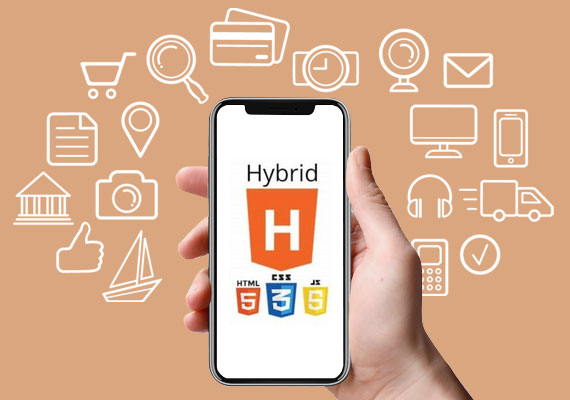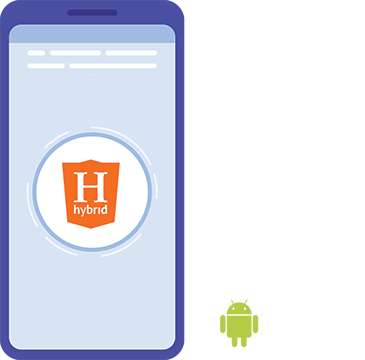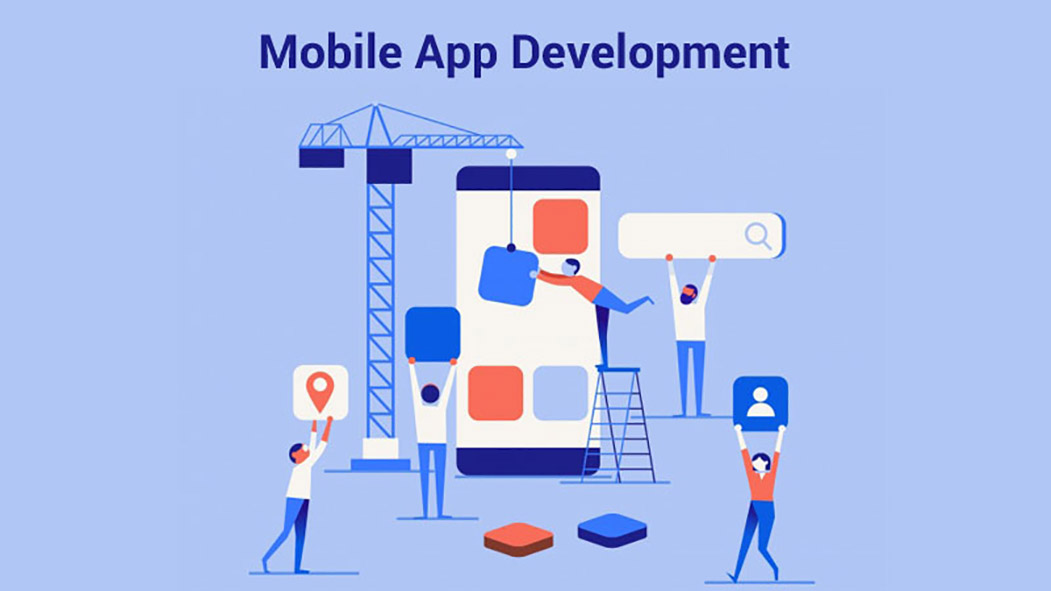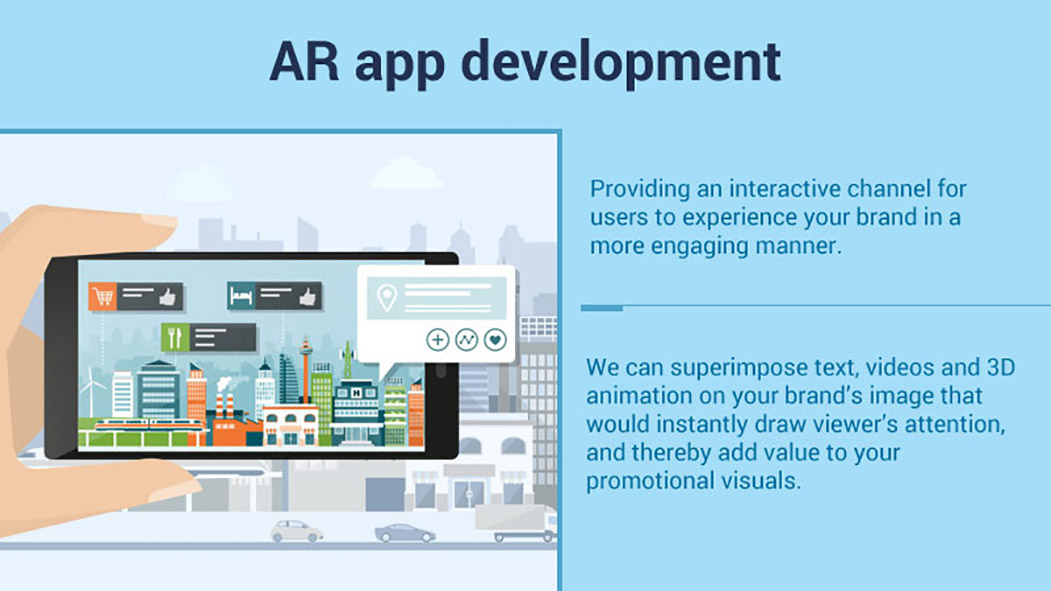Get in touch with us today!
Hybrid Application Development Services
These days, cellphones and smartphone apps are a regular part of our lives. The market is filled with a wide range of distinct operating systems, making it difficult for developers to create a single application that works across them all. Additionally, hybrid app development has emerged as a potential solution. Companies now view the development of new hybrid approaches as a feasible alternative when creating mobile applications.
What Is A Hybrid Application?
Hybrid applications are a combination of mobile web pages and native applications that comes with the advantages of both. The goal is to provide an optimized experience for users who needs to be able to access information on their mobile devices. It can be accessed by either a web browser or applications. Hybrid applications are a fusion of a mobile website and an application that works on multiple platforms. They are created by the use of web technologies, and is structured with HTML, CSS and JavaScript. This app runs on the device itself, without requiring any Internet connection.
A hybrid application is made up of three main components, these are:
1. The core application - where the business logic is implemented;
2. An interactive front end - which users interact with in order to achieve their requirements;
3. Components for integrating other systems into the overall application.
Our world has changed since the introduction of the smartphone and mobile apps. With technology advancing as quickly as it is, many companies are looking to jump onto the app bandwagon. In order for your business to succeed in this day and age, it must adapt with the times. That means discovering new ways of staying ahead of competition and developing apps with longevity in mind. While it can be challenging to determine what will be the best solution for your business, hybrid mobile app development has emerged as the obvious choice. Since hybrid applications are a form of mobile application development that bridges the gap between web apps and native applications, they are designed to meet specific business needs by combining web technologies, such as HTML5 and JavaScript, with native functions. The result is a mobile app that is more reliable and useful than either one alone.
How Are Hybrid Applications Different From Android And iOS Applications?
A hybrid application is a unified application made up of both native and web code that runs in the browser. Hybrid applications often have features similar to those seen on desktop apps, but they are capable of working cross-platform (iOS, Android and the web) with a single codebase. This makes easy to maintain. This has drastic advantages for developers and end users alike. Hybrid applications are an effective way of creating cross-platform web apps that can be tested without having to make code changes on multiple devices, and also save time and money from development.
A hybrid application is a unified application made up of both native and web code that runs in the browser. Hybrid applications often have features similar to those seen on desktop apps, but they are capable of working cross-platform (iOS, Android and the web) with a single codebase. This makes easy to maintain. This has drastic advantages for developers and end users alike. Hybrid applications are an effective way of creating cross-platform web apps that can be tested without having to make code changes on multiple devices, and also save time and money from development.
Android applications and iOS apps work differently. Android applications are usually built in Java, whereas iOS apps are usually built in Objective-C or Swift. This difference is significant because the usual design of Android applications and iOS designs is different as well.
A hybrid application contains both native functionality and containerized functionality that interacts with third-party services. The containerized functionality allows you to build mobile apps much more quickly. Hybrid applications are able to take advantage of both Android and iOS APIs, which allows developers to create a single application that works cross-platform between devices. Such applications combine the key features of an Android or iOS app with features from a web application like an HTML5 application in one single product.
Hybrid application development has a lot in common with Android and iOS apps because they contain all the same functionality. The intent of a hybrid application is to provide the type of functionality that an average user satisfies with an Android or iOS app. Such an application will typically be developed to run on both platforms. For example, a social networking app would be a hybrid app, whereas an e-commerce app would not be. Hybrid applications can have many design implications and they can add more value because of them.
Benefits of Hybrid Applications

Benefits Of Hybrid App Development
There are many reasons why hybrid app development services are important for businesses, and I'm sure most of you can think of at least one. They can be an effective way to recruit new talent as developing apps requires different skills than design or coding. These projects also give you a chance to test market demand for your product without having all the costs associated with developing a native application. Additionally, hybrid applications are a great way to enhance the functionality of your current mobile website. This can help you save money and time while keeping your audience happy and engaged.
Here are some advantages of Hybrid Applications:
- Offline Working
- Easy Integration
- Unified Development
- Enhanced User-Experience
- Faster And Easier
- Cost-Effective
- Supports Plug-Ins
- Native Expertise And A Straightforward Backend
Utilizing the technique that enables quicker and inexpensive mobile app development is essential given the rising level of competition in the digital market. Users of hybrid mobile apps can target each platform separately with native apps without having to worry about finding the best position in the online app store market. Hybrid apps also incorporate the backend and some of the functionality of a native app, combining the best aspects of each. Hybrid Mobile App Development and exponential growth that comes with such an application are necessary if you wish to maintain your position in today’s competitive market.
Hybrid App Development Technology We Use
Hybrid app development is the fastest growing segment in app development all over the world. Hybrid applications are typically created using a variety of frameworks, including Web Frameworks, Native Mobile Frameworks and UI Toolkits. Our team of talented and knowledgeable hybrid app developers is equipped to deal with all available technologies and to connect with you whenever necessary. As a hybrid app development company , our goal is to create the greatest hybrid platform mobile apps possible that operate flawlessly across all platforms without any possible defects. The technologies incorporated by our experts -
Hybrid app development is the fastest growing segment in app development all over the world. Hybrid applications are typically created using a variety of frameworks, including Web Frameworks, Native Mobile Frameworks and UI Toolkits. Our team of talented and knowledgeable hybrid app developers is equipped to deal with all available technologies and to connect with you whenever necessary. As a hybrid app development company , our goal is to create the greatest hybrid platform mobile apps possible that operate flawlessly across all platforms without any possible defects. The technologies incorporated by our experts -
Xamarin - A set of tools (framework) that programmers can use to write C# and. NET programming.
Kotlin - A software development kit created by the Google cross-platform mobile development team that enables the creation of both iOS and Android applications.
PhoneGap - An open source platform for creating hybrid apps that function across the majority of mobile platforms.
Ionic - A set of programs and tools that enables programmers to quickly create hybrid mobile applications using the same programming languages as websites and online applications, primarily JavaScript, HTML, and CSS.
Apache Cordova - An open-source framework for mobile development.

The Hybrid App Development Process We Follow
Discover Plan - To determine the viability of your project, we begin by gathering requirements, doing a competitive analysis, identifying business objectives, etc.
Design - We develop high-resolution schematics and prototypes for your website design after thoroughly understanding the requirements.
Develop - We integrate a CMS with all of your website's pages and information. There will be no undeveloped webpages or other website elements.
App Integration And Migration - Adding new features, enhancing the functionality, optimization of performance.
Tests - Your website is put through a rigorous testing process where a number of factors, including aesthetic and performance, are examined.
Deploy - We assist you with the setup and deployment of your website on any selected platform after it has been properly created and tested.
Support And Maintenance - Our experts are always available for any follow-ups or maintenance checks.

Why Must You Choose Webmantra As Your Hybrid Mobile App Development Company?
As a Hybrid App Development Company in India, Webmantra has a strong track record of creating specialized hybrid apps, which has propelled us to the top of the hybrid app development companies. We take the time to fully understand your needs and work diligently to provide the best solutions to meet them. We have always earned our clients' trust because of our commitment to excellence and competence.
- Secure And Safe Technology
- Domain Expertise
- Seamless Integration
- Dedicated Developers
- On-Time Delivery
- Innovative And Unique Solutions

 Academy
Academy


